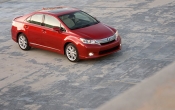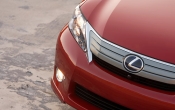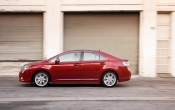Test Drive: 2010 Lexus HS 250h
The Classy, Discreet Hybrid
| Vehicle Tested: | 2010 Lexus HS 250h 4dr Sedan (2.4L 4cyl gas/electric hybrid CVT) |
|---|---|
| Pros: | Relatively brisk acceleration, buttoned-down handling, quiet and comfortable cabin, user-friendly high-tech features, excellent build quality. |
| Cons: | Touchy brakes, steering lacks road feel, can get pricey with options. |
Most carmakers would be happy with a lineup that includes one hybrid sedan; Lexus now has three. With the 2010 Lexus HS 250h, the company adds a compact luxury sedan to a mix that includes the midsize GS 450h and the full-size LS 600h L.
In the past, Lexus' hybrid sedans have emphasized major performance with a minor fuel-economy benefit — the LS 600h L, for example, promises "V12 performance with a V8's fuel-efficiency." The HS 250h breaks the mold by offering more traditional hybrid attributes — namely, high fuel economy and a minimal carbon tire print.
In fact, the 2010 Lexus HS 250h's hybrid drivetrain is the same as that found in the Toyota Camry Hybrid. And though some rumors stated that the HS 250h would be sharing its platform with the Prius, such is not the case, as they are two quite distinct vehicles engineered for different buyers. One is a sport-tuned luxury sedan, the other a versatile but rather unathletic hatchback. Those interested in learning more about hybrids in general may want to read our tech article "What is a Hybrid Car? How do Hybrids Work?"
Sounds tempting enough, but how much does it cost? There are two versions, the well-equipped base and the Premium (highlights include heated/cooled front seats, upgraded leather, rain-sensing wipers and a power tilt-telescoping steering wheel). The base will list for $35,075 (with destination), while the Premium will be $37,845. Our HS 250h Premium had virtually every option possible, bringing it up to $42,450.
That begs the question that, if you're looking for a hybrid sedan with a sporty personality (which leaves out the isolated Camry Hybrid), why not just get a less expensive Ford Fusion Hybrid? Or a Nissan Altima Hybrid, if you live in one of the eight states where it's available? You could, but then you wouldn't get the Lexus experience, which doesn't just mean driving a car with a big "L" on its grille. We're referring to the "kid glove" service treatment along with the well-crafted, well-equipped and athletic (for a hybrid) car you see here.
Still, we've a few nits to pick. Although the HS 250h offers well-rounded performance, we'd still like more communicative steering and firmer, more linear brake pedal action (a few staffers felt the brakes were touchy until they got used to them). But that said, we like that the 2010 Lexus HS 250h tells you it's a luxury sedan loud and clear (via its polished performance and pampering cabin) while only whispering (via its quiet operation and minimal gee-whiz instrument graphics) that it's a hybrid. That is, until you break the silence with a "Heck, yeah!" when you find yourself next to a Toyota Yaris at a stoplight and realize you're getting better mileage than that little econobox.
Photos
-

Taut, compact proportions give the Lexus HS 250h a sport sedan flavor; there's little to indicate that it's a hybrid.
(photo by: by Kurt Niebuhr) -

Oddly, its three-bar grille treatment looks like that of Honda's Insight Hybrid.
(photo by: by Kurt Niebuhr) -

In profile, the HS takes styling cues from old (greenhouse) and new (body-side contours) IS series sedans.
(photo by: by Kurt Niebuhr)
Performance
A 2.4-liter inline-4 in tandem with an electric motor provides a total of 187 horsepower to the front wheels through a continuously variable automatic transmission (CVT). Floor it and after a slight pause the HS quickly gathers itself up and pulls with a linear rush of power that's eerily uninterrupted by gearchanges.
We recorded an 8.7-second 0-60 time and a 16.4-second run through the quarter-mile, decent times that put the HS's sprinting ability somewhere between four-cylinder compacts and V6 sedans. Passing and merging performance is solid, as the HS 250 swiftly jets from 50 to 75 to blend in with fast-moving freeway traffic. Mountainous driving shows off the hybrid's broad power spread, as the HS 250 easily maintains speed on the upgrades, passing vehicles that resign themselves to the right lane. Over 1,051 miles of mixed driving, we averaged 30.4 mpg against a manufacturer's estimate of 34 mpg combined.
With a 125-foot panic-stopping distance from 60 mph, the HS 250's binders put up a respectable maximum-effort performance at the track. However, in normal driving the brake pedal can feel light and touchy. Still, one does get used to this after some seat time.
The HS's slightly firm suspension calibrations strike a nice balance between providing an unwavering, composed attitude when the car is pressed in the curves and a luxury ride over bumpy roads. Turn-in is crisp, and combines with the car's flat cornering poise to make the 2010 Lexus HS 250h seem lighter than its 3,700 pounds. The electric power steering is precise and fairly quick, if a bit too light and remote in feel for more serious driving enthusiasts.
Comfort
A power tilt-telescoping steering wheel along with memory functions for the power seat and mirrors make it easy to get comfortable behind the wheel. Though the HS 250h's seats don't look like anything special — you won't find an exaggerated side bolster or any fancy pleats — they're comfortable on longer trips. Up front, overall support is very good, and the heating and cooling functions for those seats come in handy.
The rear quarters aren't bad, either. The HS's tall architecture (it's a few inches taller than its ES 350 stablemate, for example) allows a higher seat cushion — one that provides ample leg support and room for taller passengers.
Since this is a Lexus, a smooth, quiet ride is expected, and the HS 250h does the nameplate proud. The absorbent suspension soaks up the bumps and ruts of neglected big-city streets without bobbing about. At 75-80 mph on the interstate the cabin is impressively free of wind noise and tire rumble, nearly rivaling the HS's silent demeanor when it's powering around in pure electric mode at low speeds. When the gas engine does kick in, it's nearly unnoticeable, as there's no shudder or other unseemly action.
Function
Many of the 2010 Lexus HS 250h's controls are tried-and-true Japanese designs, such as having the lights on the left-hand stalk and the wipers on the right. But there's also some new stuff here, such as front- and rearview cameras and iPod integration. Despite the fact that there are a lot of features packed into this little car, using them is fairly intuitive.
A good example is the "Remote Touch" multifunction controller that comes with the navigation system, and operates that as well as the climate control and sound systems. Most staffers liked its familiar "point-and-click" action (it works like a computer mouse). It employs "haptic" technology that makes it feel as if the cursor is moving over various hard buttons, which are depicted on the display screen.
The haptic "detents" can feel strange at first, but it becomes much more natural once you've experienced it for a while. The nav system also has a comprehensive traffic feature, which not only shows where the jam-up is, but audibly tells you how far ahead it is and how long it is. You can then easily select the rerouting function.
A closer look at the instruments reveals what looks like a tach next to the speedometer is actually a pair of gauges that show the hybrid status and the fuel level. The former shows whether you're driving "green" — go easy on the gas and the needle moves to the green area (which means you're using only either the electric motor or gas engine), lay into it and the needle sweeps up to the "power" area (which means you're using both).
Fully appreciated on a long trip, the optional Mark Levinson audio system easily fills the cabin with rich sound. No matter what's played — whether it's Elton John with the Melbourne Symphony Orchestra, LL Cool J or REM — sound comes through with impressive detail and clarity. A dedicated iPod connection is at the ready, should you find nothing to your liking on satellite radio.
It may not look like much, but the stubby trunk of the HS can swallow a variety of large objects. The trunk's wide opening and deep, squared-off internal shape allow you to drop a golf bag straight in — no angling required. Lexus claims it'll carry up to four bags, and we don't doubt it. A large suitcase is also easily stowed. Due to this being a hybrid (and subsequently having components occupying space behind/under the rear seat) the rear seat does not fold down. A rear-facing child safety seat is accommodated, provided the occupant seated in front doesn't mind scooting the seat up a bit.
Design/Fit and Finish
Compact and taut, the 2010 Lexus HS 250h is, in profile, somewhat reminiscent of the first-generation Lexus IS sport sedan. The grille, however, is incongruous; its three-bar-embossed insert looks more Honda Insight than Lexus. The cabin's overall design is attractive, with a two-tone treatment and warm wood accents providing an upscale ambiance. Although our car was a preproduction unit, the body panel and interior trim piece gaps were all even and tight, and the materials were high in quality and well-matched.
Who Should Consider This Vehicle
Until now, luxury brand intenders looking for a hybrid version of a compact luxury sedan were out of luck. The 2010 Lexus HS 250h, however, should meet their needs. This unique vehicle offers all the latest high-end features along with an athletic chassis, an upscale cabin and a powertrain that provides refined, respectable performance along with real-world fuel economy in the mid-30 mpg range.
Others To Consider
Ford Fusion Hybrid, Nissan Altima Hybrid.
The manufacturer provided Edmunds this vehicle for the purposes of evaluation.
Testing Conditions
Performance
Tester Comments
Specifications
Warranty
Safety
Other Road Tests for the Lexus HS 250h
Buyer Resources
- View All Styles
- Incentives & Rebates
- Price with Options
- Get a Free Price Quote
- Estimated Payments
- Dealer Inventory
- Resale Values
- True Cost to Own
Vehicle Details
Multimedia
Ratings & Reviews
- Model Review
- Road Test Ratings
- Road Test Reviews
- Consumer Reviews
- Awards History
- Reliability
- Consumer Discussions
Payment Calculators
Helpful Tools
